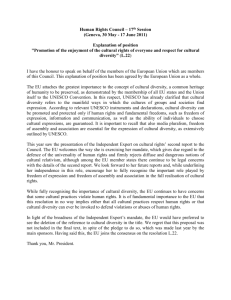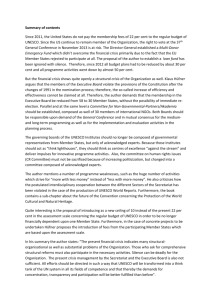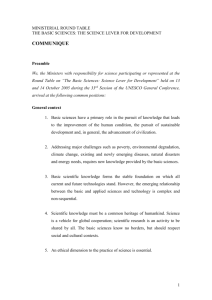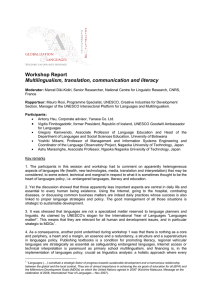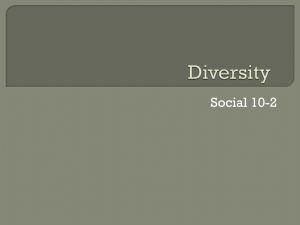25 Years Tuesday, October 27th
advertisement
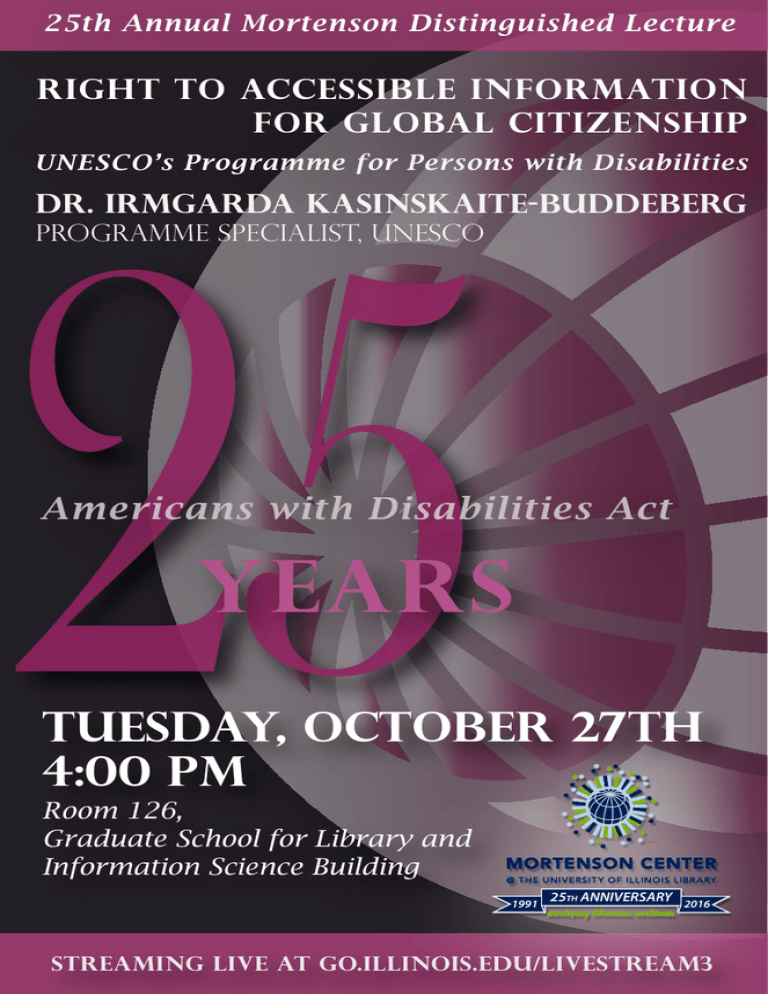
25th Annual Mortenson Distinguished Lecture Right to Accessible Information for Global Citizenship 25 UNESCO’s Programme for Persons with Disabilities Dr. Irmgarda Kasinskaite-Buddeberg ProgramME Specialist, UNESCO Americans with Disabilities Act Years Tuesday, October 27th 4:00 PM Room 126, Graduate School for Library and Information Science Building 1991 25TH ANNIVERSARY 2016 Streaming Live at go.illinois.edu/livestream3 Program of Events Welcome and Introduction Memorial Tribute to Dr. Ekaterina Genieva Clara M. Chu, Director and Mortenson Distinguished Professor, Mortenson Center for International Library Programs Marianna Tax Choldin, Founding Mortenson Center Director and Mortenson Distinguished Professor Dr. Ekaterina Genieva (April 1, 1946 -July 9, 2015), former Director General of Margarita Rudomino All-Russia State Library for Foreign Literature, 10th Annual Mortenson Distinguished Lecturer, and longterm Mortenson Center partner. Lecture: Right to Accessible Information for Global Citizenship: UNESCO’s Programme for Persons with Disabilities Dr. Irmgarda Kasinskaite-Buddeberg Programme Specialist Knowledge Societies Division, Communication and Information Sector, UNESCO Q & A Session Thank you and Invitation to Reception Clara M. Chu Reception in Lobby Thanks to Our Co-Sponsors The European Union Center The Center for Global Studies The Division of Disability Resources & Educational Servicess Special Thanks to the UNESCO Center for Global Citizenship The Right to Access For several decades, UNESCO has been promoting Education for All (EFA) which aims to provide education for all students regardless of their abilities, ethnicity, age, background or gender. Recently, several important research and assessment reports concluded that a number of countries fail to achieve The Millennium Development Goals (MDG), particularly on education, due the limited inclusion of children and students with disabilities in education. The growing number of ratifications of the United Nations Convention on the Rights of Persons with Disabilities (UN-CRPD, 2006) and other normative instruments show that countries are committed to ensure and promote full exercise of all human rights and fundamental freedoms of persons with disabilities as well as make adequate changes in national legislation, policy and strategies in order to establish a favorable and enabling environment for the targeted interventions of various stakeholders. As a part of UNESCO’s contribution to the implementation of the UNCRPD, UNESCO recognizes a need to promote the right to information through inclusive and accessible Information and Communication Technologies (ICT). The Organization acknowledges the role and impact of ICT in accessing, creating and sharing information and knowledge. As one of the leading United Nations system organizations, the goal of the presentation is to provide insight into the concrete actions taken by UNESCO to ensure that the right to accessible information for persons with disabilities is respected around the world and to contribute to the full empowerment of persons with disabilities. The presentation will also include introduction of key initiatives, research results, policy and capacity building tools developed by UNESCO as well as future plans within the context of building inclusive knowledge societies. About the Lecturer Dr. Irmgarda Kasinskaite-Buddeberg Programme Specialist Knowledge Societies Division, Communication and Information Sector, UNESCO Dr. Irmgarda Kasinskaite-Buddeberg is a programme specialist working at United Nations Educational, Scientific and Cultural Organization (UNESCO) in Paris, France. She coordinates UNESCO’s projects related to access to information and knowledge for Persons with Disabilities as contribution to the implementation of the United Nations Convention on the Rights of Persons with Disabilities. She also works on the implementation of the UNESCO’s Communication and Information Strategy on Media and Information Literacy, and multilingualism in cyberspace, particularly on the promotion and implementation of the normative instrument “UNESCO Recommendation concerning the Promotion and Use of Multilingualism and Universal Access to Cyberspace” and development of UNESCO’s World Atlas of Languages. Through a generous endowment from C. Walter and Gerda B. Mortenson, the Mortenson Center for International Library Programs was established in 1991 to strengthen international ties among libraries and librarians worldwide for the promotion of international education, understanding, and peace. An earlier gift of $2 million by the Mortensons created the Mortenson Distinguished Professorship to spearhead the initiatives associated with this mission. A closed-caption Recording of the lecture will be available for viewing on our website: library.illinois.edu/Mortenson visit us online For more information about the mortenson center’s 25th anniversary celebration and events in 2016
